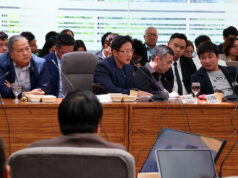KWF calls on colleges, universities to keep national language in use and dynamic
By Michelle Anne P. Soliman, Reporter
THE KOMISYON sa Wikang Filipino (KWF) has called on colleges and universities to continue offering Filipino subjects and teach courses in Filipino to keep the national language dynamic.
The appeal comes after a Supreme Court decision last March 5, 2019, which rules with finality that Filipino and Panitikan (Filipino literature) can be excluded as core subjects in higher education institutions based on a memorandum from the Commission on Higher Education (CHED).
“(S)ome administrators of colleges and universities betrayed their preference for English and dismantled their Filipino departments. Clearly, these actions were not in the CHED memorandum and more importantly, against the spirit of the language provision in the 1987 Constitution,” KWF said in a statement.
KWF Director General Anna Katarina B. Rodriguez, in a press conference on May 27 at the National Commission for Culture and the Arts (NCCA) lobby in Intramuros, Manila, said this is not the intent of the high court nor CHED.
“Marami po sa mga administrador ay pinili ang Ingles (sa pagtuturo), kaya dito po pumapsok ang adhikain na sabihin sa lahat na dapat manatili ang Filipino sa andas tersarya at hindi tanggalin ‘yung mga Filipino department dahil hindi naman ito ang intensyon ng CHED Memo No. 20, [s. 2013] at hindi din ito ang intensyon ng pasiya ng Korte Suprema (Many school administrators have chosen English for teaching, that’s why we are advocating for Filipino to be taught at the tertiary level and to not abolish the Filipino departments because it is not the intention of the CHED Memo No. 20, s. 2013 and the Supreme Court),” she said.
NCCA and KWF Chairperson Virgilio S. Almario, in the same press conference, said, “Ang gusto ng Constitution ay ma-develop ‘yung (What the Constitution stipulates is to develop the) national language as a language of education.”
Mr. Almario added, “Sa aking paniniwala, hindi mangyayari ang cultivation at intellectualization of Filipino kung hindi ito gagamitin sa higher studies. Kaya kailangang-kailangan na gamitin ito sa mga universities at colleges (I believe that the cultivation and intellectualization of the Filipino language cannot be achieved if it is not used in higher studies. That’s why we need to offer it in colleges and universities).”
The Supreme Court March ruling upholds its October 2018 decision on the constitutionality of the CHED’s memorandum titled the General Education Curriculum Holistic Understandings, Intellectual and Civic Competencies.
In the memorandum, CHED proposed to revise the curriculum to include General Education Courses (GECs) with 24 units of core courses namely: ( l) Understanding the Self (Pag-unawa sa Sarili); (2) Readings in Philippine History (Mga Babasahin Hinggil sa Kasaysayan ng Pilipinas); (3) The Contemporary World (Ang Kasalukuyang Daigdig); (4) Mathematics in the Modern World (Matematika sa Makabagong Daigdig); (5) Purposive Communication (Malayuning Komunikasyon); (6) Art Appreciation (Pagpapahalaga sa Sining); (7) Science, Technology, and Society (Agham, Teknolohiya, at Lipunan); at (8) Ethics (Etika).
These courses, CHED said, “may be taught in English or Filipino.”
The revisions in the curriculum were proposed following the implementation of the K-12 program in 2013, which extended the primary school system by two years.
“In light of the Supreme Court’s decision… KWF, as the sole government agency for the national language, acts with a renewed sense of purpose to advocate for the use of Filipino as medium of instruction in the tertiary level,” the agency said.
Article 14, Section 6 of the 1987 Constitution, states that Filipino is recognized as the national language and mandates the government to promote its use “as a medium of official communication and as language of instruction in the educational system.”
“In line with the Constitution, the KWF strongly urges the following: (1) the new GE courses be taught in Filipino and English, but with preference for Filipino; (2) colleges and universities offer more and new courses in Filipino; (3) colleges and universities encourage the use of Filipino as medium of instruction in all disciplines,” the statement said.
In 2018, the KWF started offering free retooling courses to further train educators in the usage of Filipino as a medium of instruction of GECs.
The KWF has also published three books on retooling: Babasahin sa Maluyuning Kultura na Komunikasyon, Ang Imahen ng Filipino sa Sining, and Pag-unawa sa Sarili.
For more information on retooling seminars, contact Lourdes Hinampas at 252 1953, 09276856786, or email kwf.slak@gmail.com.



